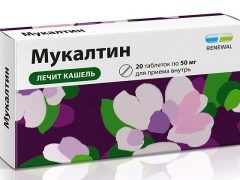"Mukaltin" during pregnancy: instructions for use
If a woman develops a cough while carrying a child, this symptom cannot be ignored. It can be dangerous at any stage of pregnancy and can be a manifestation of both acute respiratory infections and allergies. With systematic coughing, the abdominal wall will constantly strain, which can cause undesirable consequences, for example, increase the tone of the uterus, provoke premature rupture of water or placental abruption. For this reason the future mother’s cough must be treated promptly.
One of the means to eliminate coughing is Mukaltin. This drug is characterized by plant origin, rarely causes side effects and is often used not only in adults, but also in pediatrics.
However, before taking this medicine, the expectant mother is better to consult a doctor, because sometimes the use of "Mukaltin" is undesirable.
Features of the drug
Mukaltin is produced by various domestic companies, including Aveksim, Obnovlenie, Medisorb and other pharmacological manufacturers. In this case, the drug is presented in pharmacies only in one form - these are small round tablets with a characteristic odor. They are gray-brownish, and the vegetable raw material adds dark and light blotches to the preparation. On tablets there is a risk according to which the drug can be divided into halves.
"Mukaltin" is sold in blisters or in a bagless packaging of paper of 10 pieces. Sometimes the manufacturer places tablets of 30-50 pieces in tubes, bottles and plastic cases. The drug is sold without a prescription, and its price is determined depending on the number of tablets and the manufacturer (it varies from 10 to 40 rubles per pack).
Store Mukaltin at home for the entire shelf life (usually 2 or 3 years) in a dry place at a temperature of 15-25 degrees.
The basis of the medicine is the extract from the medicinal plant, which is called Althaea. Its amount in one tablet is 50 mg. It is this extract that is extracted from the roots, has antitussive action. It affects the respiratory tract due to pectins, mineral salts, polysaccharides, plant mucus, betaine, fatty acids and other active substances.
They have the ability to intensify the work of the glands in the bronchi, as a result of which the sputum is actively diluted, the mucus clears cough more easily, and the mucous membrane softens. In addition, Althaea officinalis is able to reflexively stimulate the respiratory tract (and bronchioles, and ciliated epithelium activity), as well as envelop the mucous membrane. It also helps to reduce the activity of inflammation.
To "Mukaltin" was dense and not spoiled, add calcium stearate, tartaric acid, povidone and sodium bicarbonate to its composition. The latter ingredient also has some effect on the respiratory tract, which increases the effectiveness of Althea extract.
All inactive ingredients of tablets are safe and in most cases do not cause an allergic reaction.
Indications
The use of "Mukaltin" is justified in those diseases of the respiratory system, which occur with unproductive cough.So called wet cough, in which the sputum formed in the bronchi is very viscous, so it is rather difficult to cough up. It has a thick texture, can be transparent or white, and sometimes includes greenish or yellowish streaks.
The cough during the formation of such sputum is stronger in the morning, as the secret accumulates in the bronchi at night. The drug is in demand in the treatment of laryngitis, pneumonia, obstructive bronchitis, tracheitis and other diseases.
Is it used in carrying a child?
According to the instructions for the pills, they can be used during pregnancy, since the risk of adverse effects on the fetus in the components of Mukaltin is minimal. Wherein In the early stages, many doctors still advise to refrain from treatment, since in the first 12-14 weeks of pregnancy all important organs of the baby are formed, and any outside influence can adversely affect this process.
However, early coughing is also dangerous, because during attacks, the oxygen concentration in the blood decreases, which can affect the development of the baby. And in a situation when this symptom annoys a pregnant woman, it is better to resort to herbal medicine, which is Mukaltin.
However, it is better to entrust the decision on its admission for up to 12 weeks to a specialist.
If the cough has occurred in the first trimester, it will be better to first consult a doctor, who will determine whether to take the pill, or you can get by with non-drug methods. In addition, he will tell you the correct dosage and frequency of taking the drug, as well as write out other medications, since Mukaltin is usually used in combination with other medications that also affect the cause of the disease, and not just cough.
Specialist consultation is recommended both in the 2nd trimester and in the last months of pregnancy.. Although the baby in the stomach is protected at this time by the placenta, it is better to be safe, so that Mukaltin does not cause adverse reactions. In the 3rd trimester, coughing can cause premature discharge of breast milk and the onset of labor, so Mukaltin will help eliminate this dangerous symptom. Late use of this drug is not prohibited.
Contraindications
For the reception of "Mukaltina" during pregnancy there are limitations.
- The medicine should not be used if the expectant mother has hypersensitivity to althea. With an increased risk of an allergic reaction from the use of such tablets is better to refuse, because it will be dangerous for the woman herself, and for the baby.
- The drug is not discharged with ulcerative lesions of the digestive system. Speech on diseases of the stomach and duodenum, in which the Altea will cause deterioration.
- Treatment with Mukaltin is not indicated if the expectant mother’s cough is dry. With this type of cough, the medicine will not have the desired effect, so you should consult your doctor for the selection of another treatment.
How to use?
The drug is taken before meals (preferably in 30-60 minutes) and washed down with clean water in a small amount. The tablet can be swallowed or absorbed in the oral cavity, and also dissolved in warm water.
A single dose is specified by a doctor, but usually it is one tablet, although in some cases two tablets are required at once.
The frequency of use of "Mukaltin" - two or three times during the day, and the duration of admission is determined for each expectant mother individually. Most often, the drug is prescribed for one week, but depending on the characteristics of the disease, tablets can be taken for a shorter period (for example, only 3-5 days) and longer (for serious diseases, up to two weeks).
Sometimes the drug is used for inhalation.which carry out in the nebulizer. For one procedure, take 80 ml of saline and one tablet "Mukaltina", and then take 3-4 ml of the resulting solution. The drug is inhaled for 5 minutes once or twice a day.
Such inhalation treatment must necessarily be agreed with the doctor.
Can it hurt?
Since the basis of "Mukaltina" is a plant extract, the drug can provoke allergies. Such a reaction to the drug will manifest as an itchy skin, a rash, nausea and other negative signs, with the appearance of which the expectant mother should immediately stop taking the pills. Sometimes during treatment with Mukaltin, dyspeptic symptoms appear, which usually also force you to refuse such pills.
Negative manifestations on the part of the digestive system can be observed even if the dose prescribed by the doctor “Mukaltin” is not observed. If the drug to drink in larger quantities than is permissible, then it will cause vomiting, loose stools and other signs of overdose. To eliminate them, you can take a sorbent approved for pregnant women (for example, Enterosgel) and drink more so that the active components of the tablets leave the patient's body more quickly.
Reviews
On the use of "Mukaltina" when coughing during pregnancy, they respond mostly positively. Future mothers praise the medicine for accessibility and plant base. According to them, the pills help to thin the sputum, making it easier to cough, cough itself becomes less intense and soon passes.
Among the minuses "Mukaltina" usually call it not too pleasant taste.
Analogs
If you need to replace "Mukaltin" with a similar medicine, the expectant mother can use "Altea syrup". This medicine also affects the respiratory tract due to the extract from the Althea drug, which allows the use of the drug in the treatment of tracheitis, bronchitis and other respiratory diseases. In addition, this syrup is much more pleasant to take than bitter tablets.
Other expectorant drugs, for the manufacture of which use thyme, plantain, marshmallow, ivy, licorice, primrose and other plants affecting the sputum and the condition of the bronchi, can also be used as a substitute for Mukaltin. They are represented by syrups, lozenges, drops, tablets and other forms. but pregnant women can not use these medicines without first consulting a doctor.
Indeed, in the composition of these drugs are prohibited for future mothers components, for example, ethyl alcohol in the composition of the syrup "Bronchipret", "Licorice Syrup" or the elixir "Bronhikum TP". And many of these drugs contain several plant extracts at once, which increases the risk of an allergic reaction.
Such plant-based remedies that are popular in the treatment of coughing, such as Gadelix, Doctor Mom, Herbion, Prospan, Plantain Syrup, Eucabal, and many others, are not worth using during pregnancy, since their effect on the fruit has not been studied.
The use of capsules "GeloMirtol»Prohibited in 1 trimester, but valid in the second and third trimesters as prescribed by a doctor.
As for the analogues, which are produced on a non-plant basis, then a doctor should also find a suitable tool among them. Containing ambroxol, carbocysteine or bromhexine drugs quite effectively reduce the viscosity of bronchial secretions and facilitate coughing, but not used in early pregnancy. But it is better not to use acetylcysteine-based products for expectant mothers, replacing them with safer analogues.
Instructions for use "Mukaltina" presented in the next video.
























